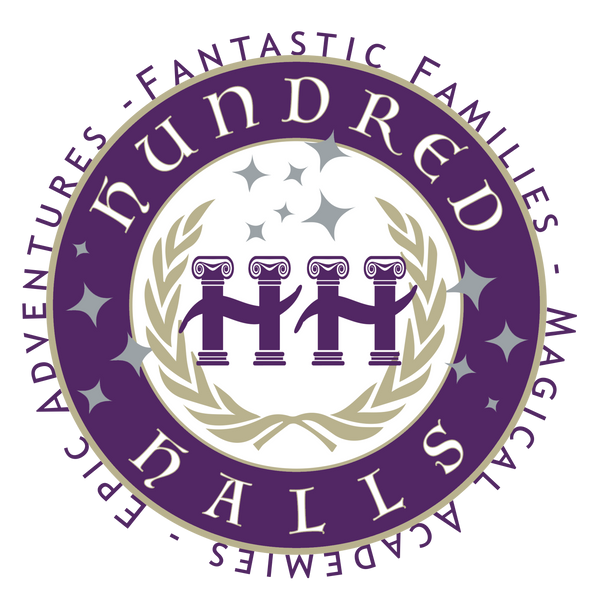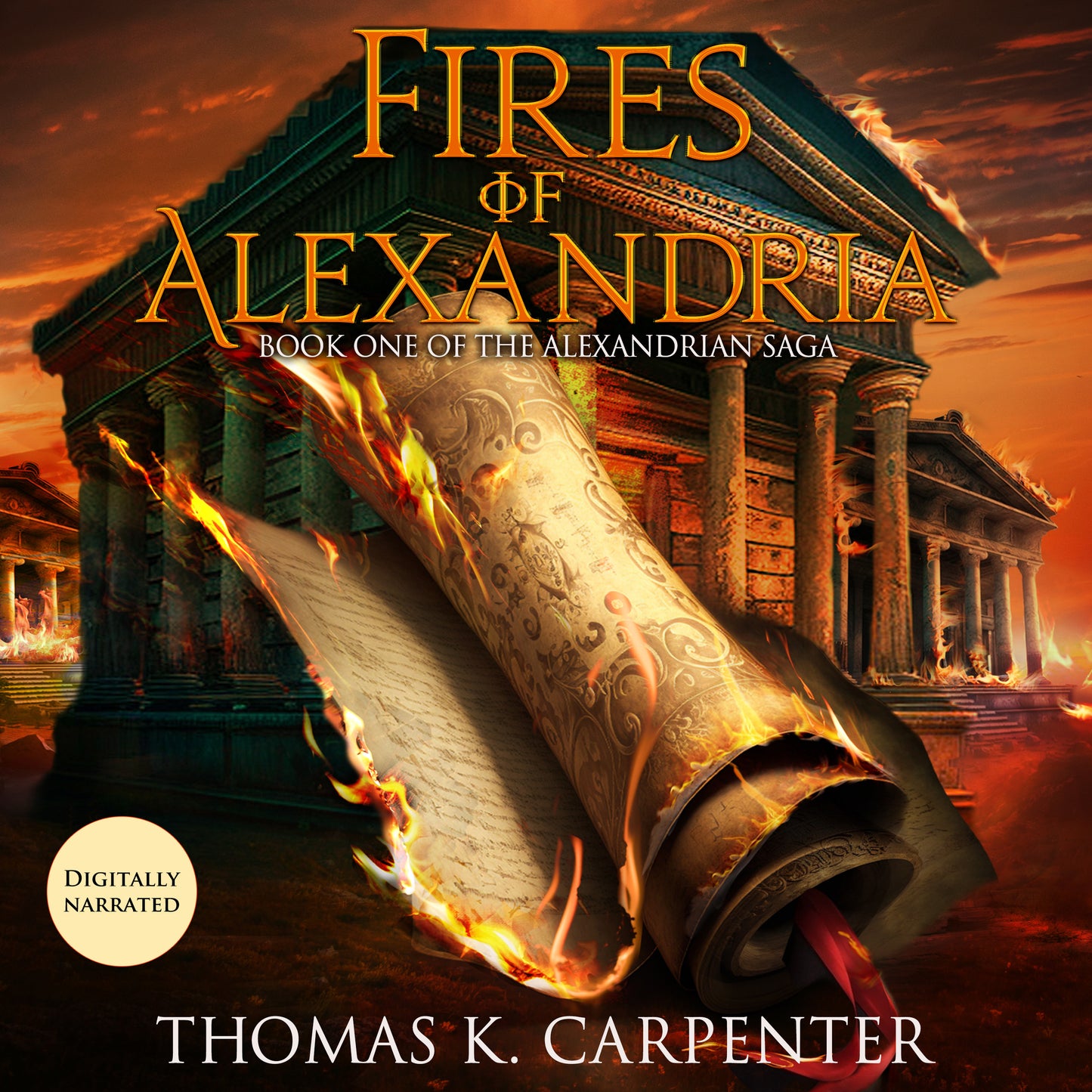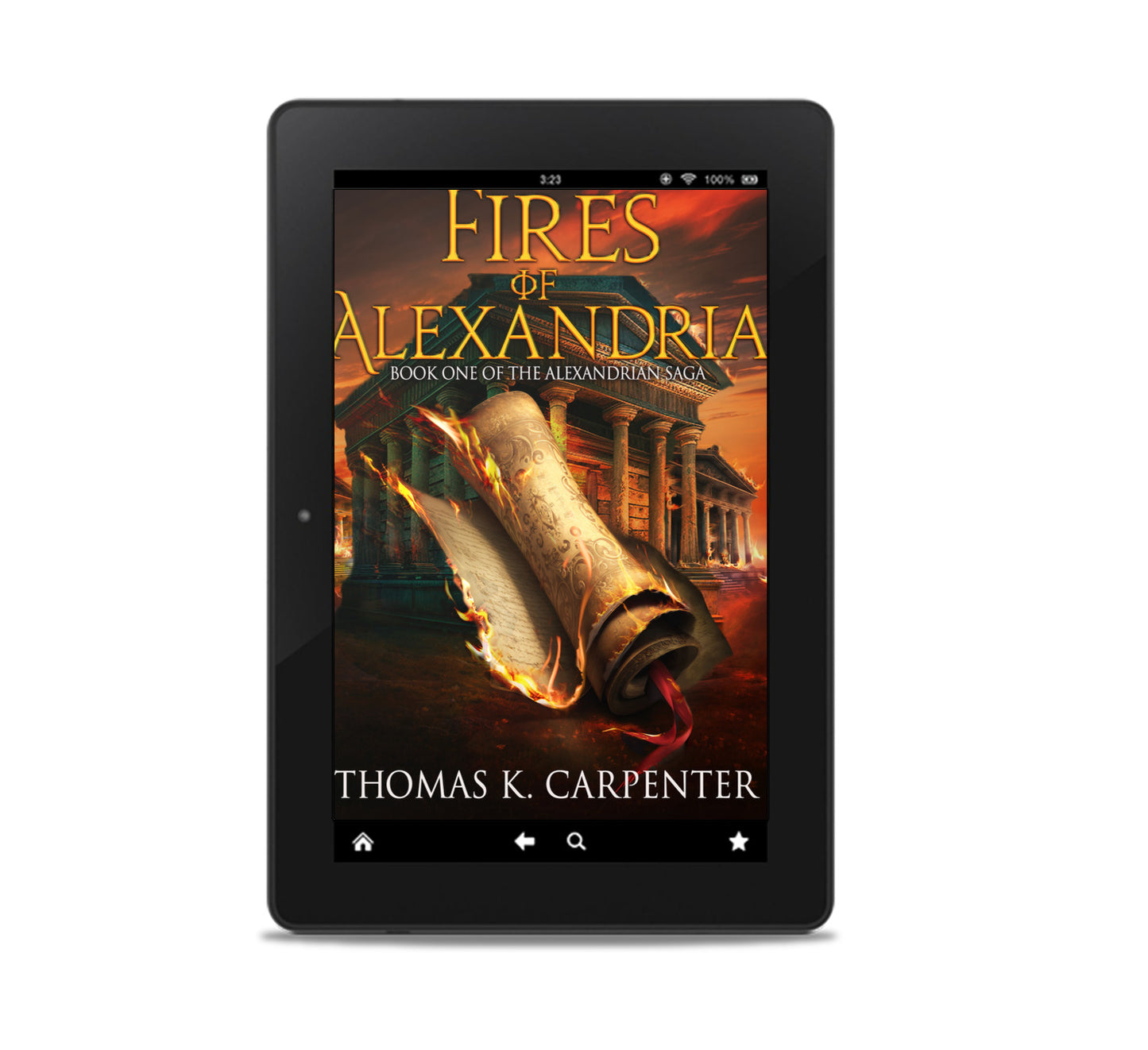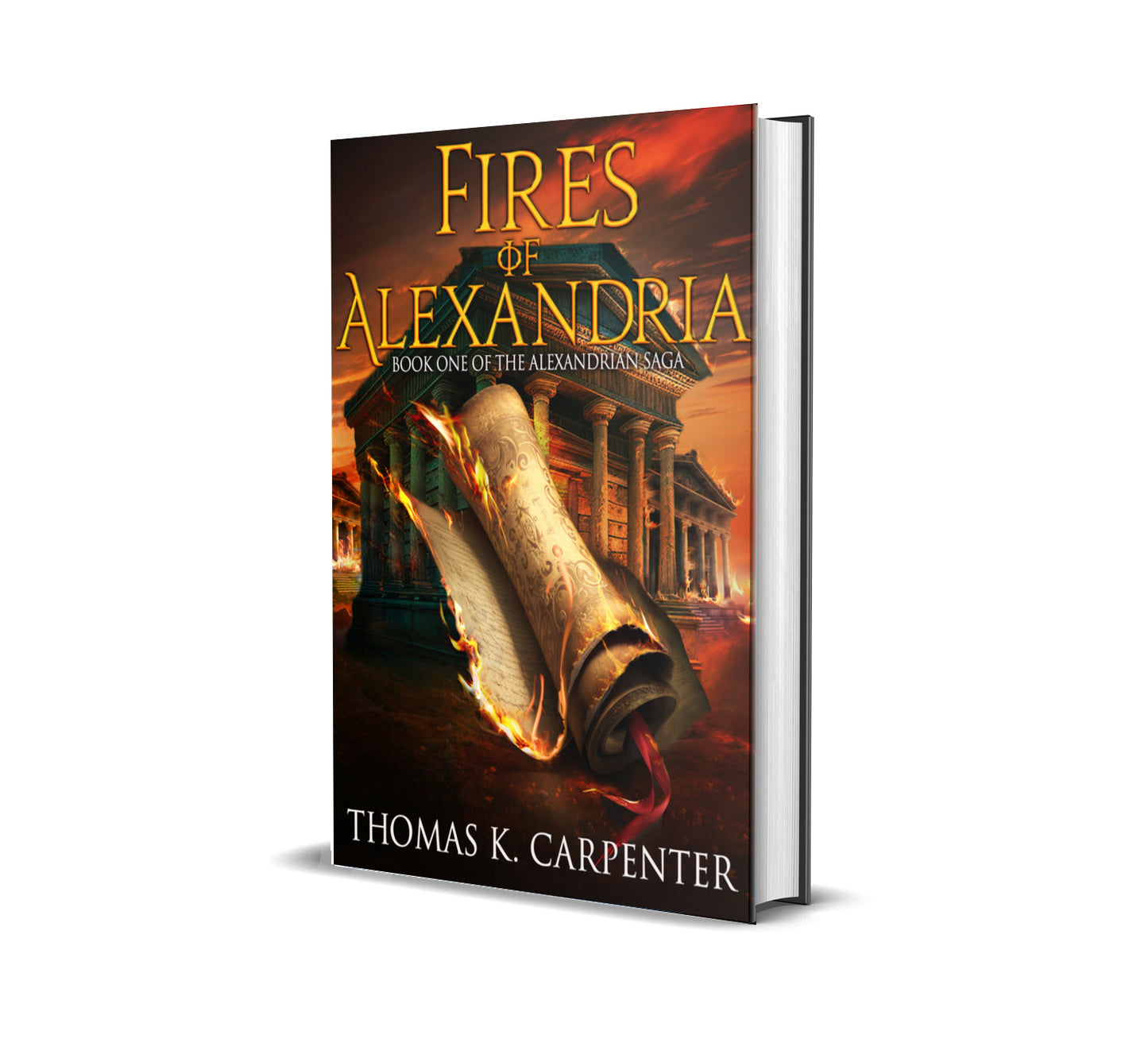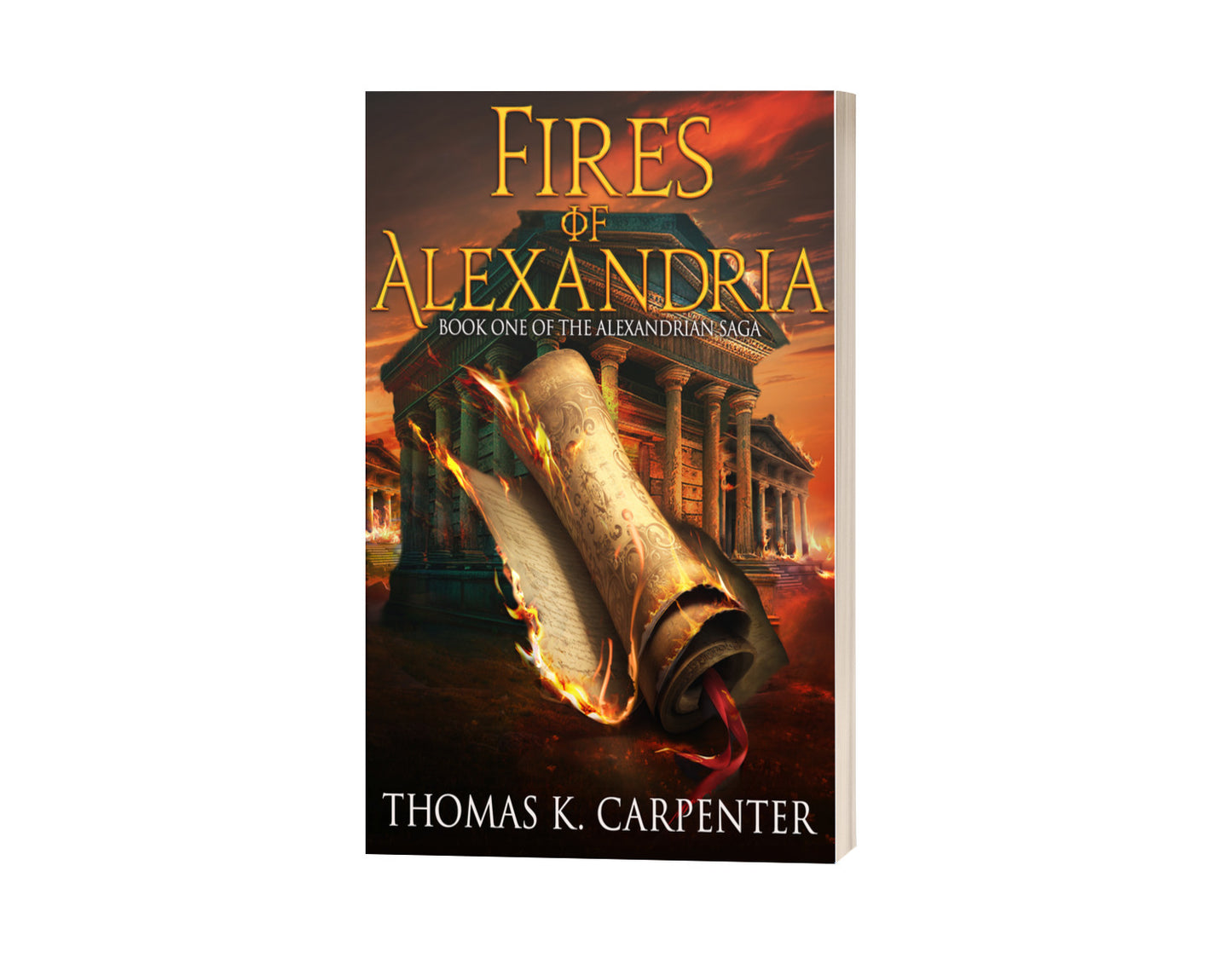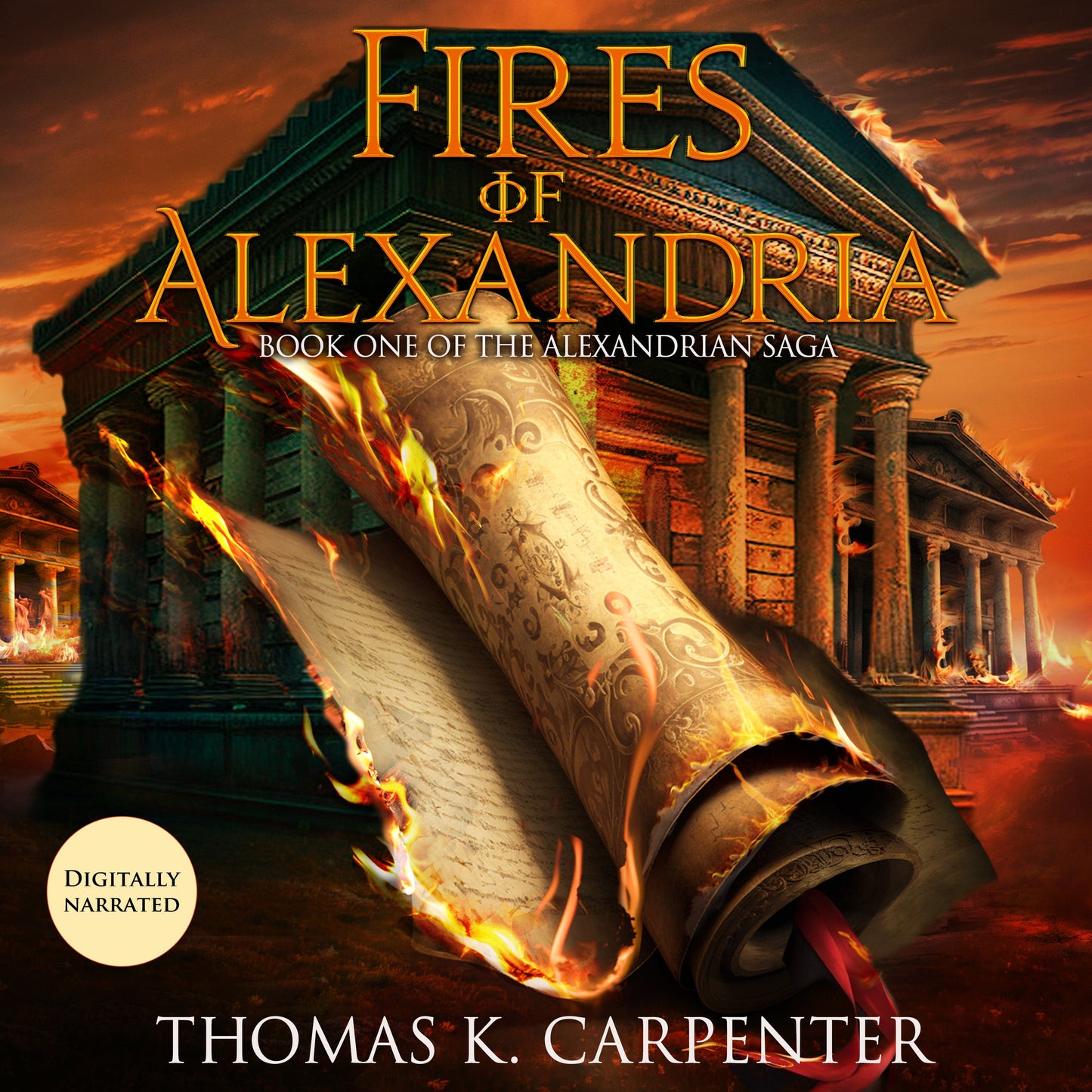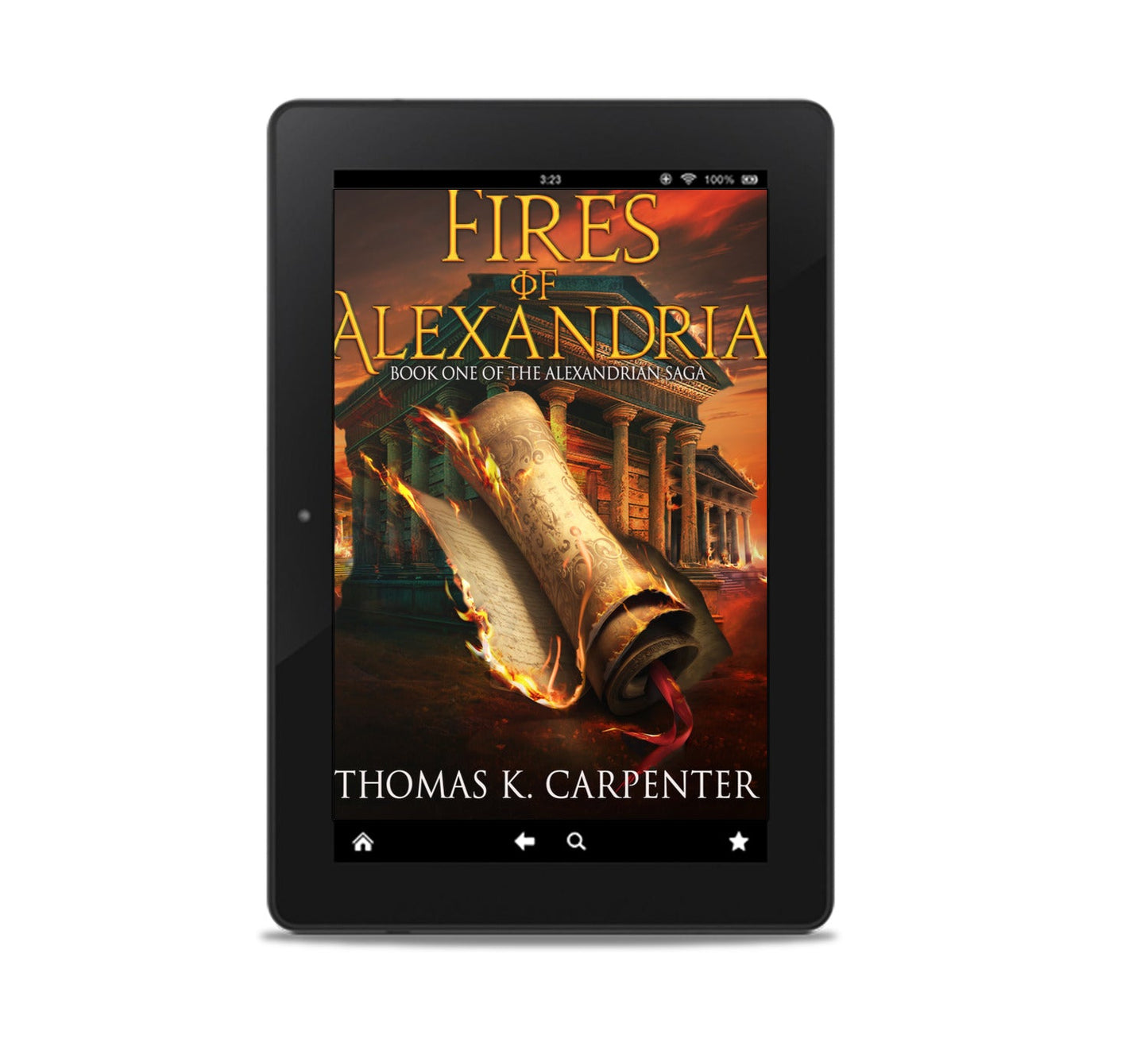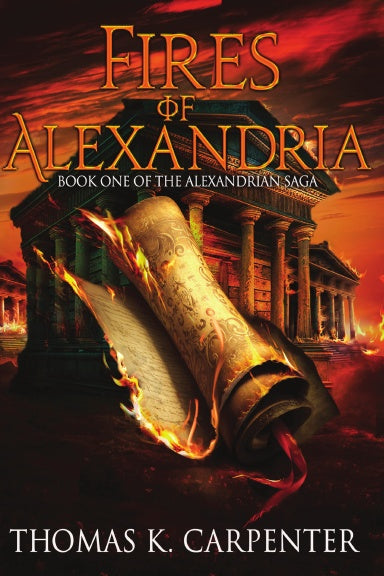BookFunnel
Fires of Alexandria
Fires of Alexandria
Couldn't load pickup availability
- Purchase the eBook instantly
- Receive Download Link via Email
- Send to Preferred E-Reader and Enjoy!
Main Tropes
- Alternative History
- Epic Storytelling
- Clash of Empires
Synopsis
Synopsis
Secrets of the ancient world. An Empire in turmoil. Inventions that nearly changed history.
Heron of Alexandria—the city's most renown inventor and creator of Temple miracles—receives coin from a mysterious patron to investigate the ancient mystery of who set fire to the Great Library. Desperate to be free of the debts incurred by her twin brother, she accepts and sets in motion a chain of events that will shake the Roman Empire and change the course of history forever.
Intro Into Chapter One
Intro Into Chapter One
Chapter One
The blistering sun in the sky silenced the simmering rage that Agog had carried with him from the North. He sunk his teeth into the hunk of burnt meat he'd bought on the last street.
Spices littered his tongue, setting his nose to itch. The man who'd sold him the meat had killed the flavor with too much taste. Agog threw the half-finished meal to the dirt and wiped his greasy hands on his furs. A scrawny dog snatched the meat and skittered back into the sea of legs.
Agog wound his way toward the Sun Square, admiring the orderly nature of the Alexandrian streets, crisscrossing in perpendicular lines like soldiers arrayed in battle. White-crested parapets, gilded turrets, and solitary towers stretched into the faded blue sky, filled in with colorful flags, streamers, and strange bronze cups on poles spinning madly in the upper breezes.
Beyond the edge of the city proper, the white marble Lighthouse reached high into the sky, flaunting the engineering knowledge of Alexandria. Built upon the island of Pharos, across the bay from the city walls, the Lighthouse commanded the skyline.
Agog had marveled at the light from it during his travel across the Mediterranean. Its beacon had reached across the sea, guiding their ship in, well before even the hint of land could be seen. Like the Great Library, the Lighthouse was a symbol of Alexandria's power.
He squeezed the dirt with his toes, feeling the thrum in the soil, as if a herd of beasts thundered past the city. Agog wished to yoke that energy to his needs.
The square heaved with people, amplifying the heat from the midday sun. Using his great bulk, he shouldered through, ignoring the stares and using their hesitation to make his way.
A gaggle of dark-skinned beauties wrapped in colored scarves, baskets perched on their heads, blocked his view. Agog grunted and a portly fellow in sea-blue trousers and an open-shirted vest gave him berth to pass, eyeing him suspiciously.
His nose set to itching again. The conflation of scents overwhelmed his nose. He had not the time nor the inclination to sift through their various subtle charms. Agog preferred the smell of cold wind, of charred wood in a hearth, of the sharp tint of salty air.
A slight reed of a fellow, dressed in purple silks, settled next to him. Agog wrinkled his nose at the man's perfumed aura.
Agog abhorred the fellow's presence and his shoulder leaning against his side, but there was little he could do in this crowd. New people streamed into the square, squeezing them like slaves in a hold.
The meat seller had told him a tale of miracles in the square at the sun's zenith. Agog had chortled and paid the man for the meat.
Still too far away from the center to witness the miracle, Agog wiped the sweat from his brow and prepared to push further in. A delicate touch under his skins alerted him to a thief.
Agog grabbed the perfumed fellow's hand, now dipped inside his skins, cozily next to his coin purse, and squeezed. The thief screamed a high willowing yelp as his bones crunched under the pressure.
The crowd, sensing trouble, gave them room, as if they were a fire too hot to stand by. Agog leaned down and put his bearded face up to the man's, holding his broken hand in his own. The man's eyes were all white, covered in fear, and spittle formed on his lips.
"Not a good idea," said Agog in fluent Greek.
Agog held up the man's offending hand and all nearby eyes followed. He snapped the wrist back, breaking it, while removing his coin purse in the same movement. Agog pushed the perfumed thief backwards to fall on his rear, cradling his mangled hand as he hit.
Sensing the anticipation of the crowd, he left the thief, slipping the man's coin purse into a hidden pocket beneath his furs, next to his great belly. The purse the thief had been trying to steal was filled with worthless ceramic chips.
When Agog finally reached the spectacle in the center, he grumbled his disappointment. While the faces around his seemed in perfect adoration to the statue, he could not gather the reasons why.
Agog had seen statues before, especially ones of Roman soldiers with shield and gladius. He'd even seen bronze statues in Byzantium and Corinth before he'd taken passage. The stone statues in his lands in Old Gotar had proper Suebian knots like his own and towered over these, but lacked the artistic detail captured in the softer metals.
Sticking out from the soldier's head, a metal pole climbed high above the square. A strange four cup spinner adorned the top, rotating in the breeze. This close to the statue, Agog could see that the pole did not move while the spinner did.
When the crowd gasped, Agog returned his focus to the statue in time to see its upper body rotate sideways and extend its shield. While many recoiled backwards at the sight of the moving statue, Agog leaned forward to study it.
The statue continued its movements, its head surveying the crowd. As the bronze soldier's lifeless eyes passed over Agog, he bared his teeth at it and instinctively reached for his weapon, which he had not carried in many months. Neither the Romans nor the Egyptians wanted to see an armed barbarian in their midst, so he went empty-handed.
The statue continued its survey as if it were picking out a target in the crowd. As its focus seemed to gravitate to one area, the people stepped backwards.
In a sudden movement, the bronze soldier lifted his sword high above his head and thrust it forward as if he were leading a charge. A jet of water streaked out from the sword tip, spraying the people directly in front of the statue. A great cheer went up in the crowd and gentle laughter ensued, directed at the folks who'd been doused.
The bronze statue returned to its original position, and the energy in the crowd released as people filtered out of the square. Already, the strangling body heat lessened around him.
Agog grabbed an old man with sparse graying whiskers on his chin. His wine-soaked breath was potent up close.
"Who made the living statue?" asked Agog.
He wondered if he'd made a mistake when the old man opened his near toothless mouth, eyes rolling wildly. Agog gave the old man a little shake, and he seemed to snap out of his stupor.
"Philo the Maker," said the old man.
"Is Philo the greatest of these miracle workers?" asked Agog.
The old man grinned. "For a beast, you do speak well."
In a different place, Agog might have strangled the old man for his provocation, but he knew the old man carried the tongue of a man in his decline, long past caring.
Agog returned his rueful smile. "In my lands, I'm king of the beasts. And as king, I treat with my enemies so that I may understand them. My thralls taught me the words in Latin and Greek, though they lay awkwardly on my tongue."
The clouds across the old man's eyes parted, leaving him nearly cognizant. He leaned back in Agog's grasp and regarded him fully, like he was trying to take in the size of a mountain from up close.
"Philo is the most well-known of the makers. His family has burgeoning lands, filled with sweet grains, and coffers bloated enough to fund his gifts to the city," said the old man.
Agog sensed his seizing of the old man had been quite fortunate. He suspected he might have once been a philosopher, by the dirty robes, threadbare and littered with wine stains. Maybe he had even once worked in the Great Library itself.
"And what else?" He shook the man again, lightly, to keep him in the present.
"Philo has wormed his way close to the Roman governor Flaccus so he can gain favorable contracts," said the old man.
Agog grimaced. Such close links to the Roman hierarchy would do him no good.
"Other miracle workers?" Agog asked. "Are there any that rival Philo?"
The old man cackled, shuddering like a beaten rug. "There is one. One who is probably greater and also in the same breath the worst of them."
Agog leaned close to the old man's face, ignoring the putrid stench. "Tell me." Agog smiled.
"They say that Heron of Alexandria is the greatest of these miracle workers. Conjuring miracles out of clay and stone and metal. Making the air speak and whole armies of metal soldiers march on their own," said the old man.
Agog smirked. This was the miracle worker he wanted. Not one to spit water from a sword. That would not help him win the battles he desired.
"And why is he the worst of them?" asked Agog.
"He is cursed. Cursed by the gods for some crime we are not privy to. Maybe he stole the knowledge for making these miracles from the gods and they cursed him with bad luck so his miracles would always fail," said the old man, grinning wildly.
"Are there no others?" Agog asked after some thought.
"None if you want the greatest of them," the old man replied.
Gazing at the feeble bronze statue, Agog weighed the two in his mind. Without a powerful army, he would not be able to claim his weregild.
Agog closed his eyes, ignoring the stifling heat and keeping his hand firmly attached to the old man. The visage of Aurinia floated into his mind: raven hair intertwined with feathers and other trinkets, wide, expansive eyes the color of deep ice, and soft delicate hands that held long memories of time under the furs.
Agog made up his mind. He pulled out the perfumed thief's coin purse and shoved it into the old man's gut, requesting directions before he released him.
The coin had been more than the old man deserved, but he wanted to ensure he stayed immersed in buckets of wine and forgot about the questions.
Agog the barbarian strolled down the wide avenue in bare feet, wearing matted, greasy furs. The heat coated him in a fine sheen of sweat, though he appeared not affected by it.
He took a great breath, inhaling the multitude of scents thick in the streets, this time not overwhelmed by their strangeness. Agog cataloged them: the potent spices and the sweet breads, the odors of camels and hearth fires, the braziers of incense burning in a city crowded with temples, the sharp, metallic tint of foundry fires reducing ore, unwashed bodies drenched in sweat, and the sea air cleansing them all when the breezes wound south.
He inhaled them in their entirety. To foil the Romans and snatch the city of Alexandria away from them, he needed to know these smells as if they were his own.
Agog grinned and tramped off in search of his miracle maker.
